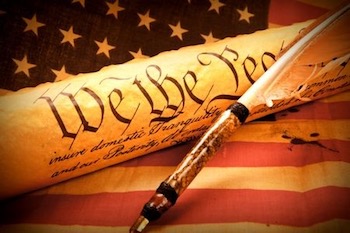 National and local inventor clubs across the U.S. along with early stage investors and small patent centric startups came together to support a very important case. Together we represent the core of the American job creation engine and the bedrock of our economic prosperity. We participated in an amicus brief in support of MCM Portfolio asking that the Supreme Court grant certiorari to MCM Portfolio v. HP and then find inter partes reviews (IPR) unconstitutional.
National and local inventor clubs across the U.S. along with early stage investors and small patent centric startups came together to support a very important case. Together we represent the core of the American job creation engine and the bedrock of our economic prosperity. We participated in an amicus brief in support of MCM Portfolio asking that the Supreme Court grant certiorari to MCM Portfolio v. HP and then find inter partes reviews (IPR) unconstitutional.
The following summary from our amicus brief outlines the negative effects created by IPRs, which were enacted under the America Invents Act of 2011 (AIA). Our brief further places the damage of IPRs in perspective by adding for context ten years of destruction caused by overzealous legislation and ill-advised court decisions in the errant quest to kill imaginary patent trolls. It illustrates how the current disorder of the patent system levies the most damage on those least able to handle it, inventors, early stage investors and small patent centric startups, and how that damage is harming the American economy.
[Supreme-Court]
What follows is the Summary of the Argument from the amicus brief filed by inventors, inventor clubs and investors:
The inter partes review (IPR) procedure Congress enacted through the Leahy-Smith America Invents Act was meant to address the threats posed by “patent trolls”—firms that hold up innovation through harassing litigation based upon patents of dubious validity—by providing a cost-efficient alternative to litigation to challenge those patents’ questionable validity. That streamlining goal was laudable. But Congress went too far in disrespecting patentholders’ property rights as a means to achieve those supposed efficiencies. IPR strips patentholders of essential protections they would enjoy if they were defending their patents in the federal judicial system, including a jury of their peers, a disinterested, life-appointed judge, and procedural limitations meant to limit their liability and permanently settle their legal rights. In their place, Congress erected a heavily slanted administrative procedure designed to invalidate patents, even when those same patents would be validated in district court proceedings.
Amici agree with Petitioner that this procedure was beyond Congress’s power to impose, and its underpinning rationale—that patents are a matter of administrative largesse, rather than the constitutionally protected property right—is constitutionally infirm. Amici write separately because this case presents an issue of enormous significance with far-reaching consequences for inventors, investors, and small-business owners.
The institution of IPR review has made patents more expensive to obtain and defend, and has introduced uncertainty in patent rights that makes patents less valuable to their holders, less attractive to inventors, and less safe for investors. This devaluation of patent rights has measurably diminished the value of all patents—even those that will never encounter an IPR proceeding—threatening the livelihoods of inventors, the cause of innovation, and the health of the American economy as a whole.
The need to affirm the property interests at stake, recognized since before the Founding, provides compelling reason for the Court to consider the constitutionality of the IPR procedure. And the ongoing nature of the harms this administrative scheme inflicts make it important for the Court to act sooner rather than later. The practical problems produced by Congress’s improper supplanting of federal district courts’ legitimate authority will only worsen over time. And Congress’s constitutionally infirm understanding of patent property rights is likely to taint further patent reform efforts already on the horizon. Accordingly, the Court should take this opportunity to address this important issue.

![[IPWatchdog Logo]](https://ipwatchdog.com/wp-content/themes/IPWatchdog%20-%202023/assets/images/temp/logo-small@2x.png)

![[Advertisement]](https://ipwatchdog.com/wp-content/uploads/2024/03/IP-Copilot-Apr-16-2024-sidebar-700x500-scaled-1.jpeg)
![[Advertisement]](https://ipwatchdog.com/wp-content/uploads/2024/04/Patent-Litigation-Masters-2024-sidebar-early-bird-ends-Apr-21-last-chance-700x500-1.jpg)

![[Advertisement]](https://ipwatchdog.com/wp-content/uploads/2021/12/WEBINAR-336-x-280-px.png)
![[Advertisement]](https://ipwatchdog.com/wp-content/uploads/2021/12/2021-Patent-Practice-on-Demand-recorded-Feb-2021-336-x-280.jpg)
![[Advertisement]](https://ipwatchdog.com/wp-content/uploads/2021/12/Ad-4-The-Invent-Patent-System™.png)







Join the Discussion
9 comments so far.
Anon
June 7, 2016 06:09 amEric,
Is there a reason why you have left off the “modern” trilogy of Breyer, Stevens, and Douglas?
Eric Berend
June 7, 2016 02:13 am^^^ correction to 7., above: where it reads in paragraph 6, line 2, “…of judicial dicta”, please replace with”…of judicial opinions”.
Eric Berend
June 7, 2016 02:09 am@ 6., ‘step back’: thank you for asking. Very well. At the risk of attracting opprobrium from those with strongly dissenting opinions, I will offer my own personal listing of the worst Supreme Court Justices in U.S. history:
James Clark McReynolds
Roger Taney
Melville Fuller
Samuel Chase
Ward Hunt (partly for his insignificance and partly for conduct while serving on the N.Y. Court of Appeals in the famous trial of Susan B. Anthony; such unethical and impeachable conduct disqualifies him from his nomination, which was enacted, nonetheless)
“de facto’: J.C. Bancroft Davis
Because issues have varied in their importance and position in the ongoing formation of U.S. jurisprudence, and not all terms present each Justice with equivalent opportunities for decisions with precedence forming judicial law or its dicta, I accord greater weight for attitudes and actions than those who rate by power or effects of decisions rendered.
The common notion of inactivity attributed to Associates of the Marshall Court (e.g., known as “Marshall and the six dwarfs”) reflects a lack of access to historic records, if any existed according to the practices of that era. Some of these were extensively consulted with by Marshall, prior to various decisions of that Court; even though their written opinions seldom appeared. For instance, a commonly held evaluation of “one of the worst” or “one of the most insignificant” as regards one Gabriel Duvall, is inappropriate; as it also ignores the quality of his one known opinion, a dissent in Mima Queen v. Hepburn (1813; please see https://www.law.cornell.edu/supremecourt/text/11/290).
Nor, do I fail to consider extenuating circumstances, such as ill health; if it limited a particular Justice’s lifetime contributions to the Court; as was the case with Alfred Moore. If the courts of the this nation can apply the principle of consideration of legislative intent in their decisions; then, in like manner; I observe intent and character, when considering my own evaluation of U.S. Supreme Court Justices.
As for Mr. J.C.B.Davis, he was the Supreme Court Reporter whose Headnote carried forth the force of judicial dicta, without the actual panel ever being required to provide a proper hearing upon the matter, in Santa Clara County v. Southern Pacific Railroad (1886), to wit: “….Before argument, Mr. Chief Justice Waite said: The court does not wish to hear argument on the question whether the provision in the Fourteenth Amendment to the Constitution, which forbids a State to deny to any person within its jurisdiction the equal protection of the laws, applies to these corporations.” So, the former president of the Newburgh and New York Railway Company Mr. Davis, made sure that their undisclosed opinions that he alone claimed in said Headnote, would be preserved for posterity.
The fruits of Mr. Davis’ poisoned tree are seen today. Jefferson’s warnings about “…the aristocracy of our monied corporations which dare already to challenge our government to a trial by strength, and bid defiance to the laws of our country” were well founded. And, probably out of the normal scope of perception for the vast majority of interested observers, the notion of ‘equal protection under the 14th Amendment for a corporation’ bore much less permanence in an era when corporations were strictly creatures that existed at the assent and pleasure of the State in which it was incorporated and could be dissolved by said State for a number of reasons empowered legally on a broad basis. An assumption of perpetuity that is now functionally and unconsciously appurtenant to all corporate structures today, was not originally part of the power bargain with the U.S. and individual States’ public interests.
step back
June 5, 2016 08:08 amEric @5
Which Justices do you hold in disrespect?
I can think of a few who deserve public shaming.
While Scalia was an eccentric originalist, at least in the Myriad decision he admitted that he did not understand molecular biology. The rest of his brethren and sister-en just went boldly forward where no rational person hath gone before and started glibly plucking those bananas off the tree of biochemical ignorance with no regrets.
Eric Berend
June 4, 2016 12:59 pm@ 5., Heller, I greatly appreciate your making reference to Justice Story. He, along with Justices Hand, Brandeis and Cardozo, are the historic Supreme Court Justices whom I hold in the highest respect.
Edward Heller
June 2, 2016 07:56 pmstaff, to the big boys, this is called “efficient infringement” and it is not unlike efficient breach — where the cost of performance by one party is greater than the damages to the other, the one party is encouraged to breach and pay the other party his damages. The efficient infringer wants to exist in a system where the patents of others are mere matter of “damages,” not, enhanced damages or an injunction, where in the end, the efficient infringer pays no more than the value of the invention regardless that he has forced the patent owner to great expense to get it.
Story, the great Supreme Court judge, said that if patent damages only include legal damages, that enforcement of any patent would soon bankrupt any patentee. That is why he thought that juries could also award the cost of enforcement in addition to legal damages.
staff
June 2, 2016 06:30 pm‘errant quest to kill imaginary patent trolls’
We fully agree. All this talk of ‘trolls’ is just propaganda by large infringers to cover up their theft of others inventions and justify what they call ‘patent reform’.
For our position and the changes we advocate to truly reform the patent system, or to join our effort, please visit us at https://aminventorsforjustice.wordpress.com/category/our-position/
or, contact us at [email protected]
Edward Heller
June 2, 2016 05:15 pmGreat Brief, Paul. The mere existence of IPRs is fundamentally harmful to the US patent system. Chris Gallagher said the same here https://ipwatchdog.com/2016/06/01/reframe-patent-reform-debate/id=69623/
“Corrosive changes in patent law are undermining research university commercialization of patented, federally-funded basic research, endangering our nation’s innovation ecosystem. Mounting uncertainty repels private investment needed to convert new discoveries into innovative public benefits. Prominent investment destabilizers include: post development invalidation, big-tech’s efficient infringement, increased costs of patent enforcement, looming congressional patent reform, and foreign IP theft and price/access manipulation. Collectively these uncertainties can crumble our country’s world-class innovation ecosystem. We must use the limited time left to reverse that catastrophic outcome by seizing every opportunity to do so.”
Curious
June 2, 2016 12:01 pmI particularly liked this brief. I believe it emphasized how the “American [Infringes] Act” (AIA) devalued the patent rights of ALL inventors (not just patent trolls) and was a huge giveaway of property rights that also placed an disproportionately large burden on small inventors/businesses.
It is one thing to talk about the big picture constitutional issues, but this brief really laid out how the AIA has harmed American inventors and will ultimately harm the US economy.